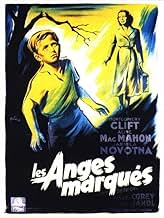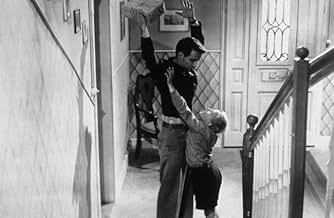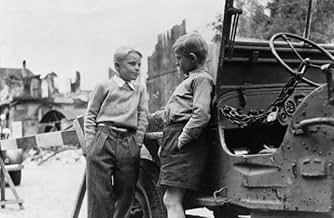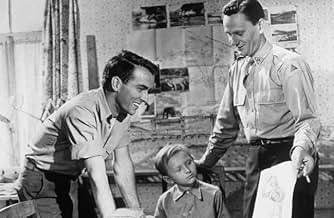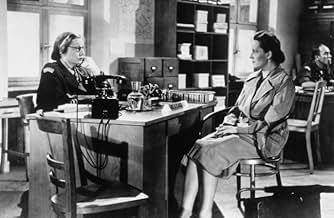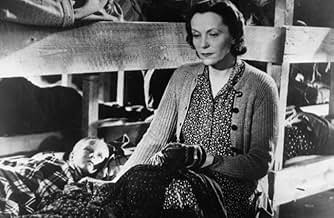Im anschaulichen Drama The Search wandert ein kleiner Junge, der Auschwitz überlebt hat, durch das Deutschland der Nachkriegszeit - allein, wild, stumm und verängstigt.Im anschaulichen Drama The Search wandert ein kleiner Junge, der Auschwitz überlebt hat, durch das Deutschland der Nachkriegszeit - allein, wild, stumm und verängstigt.Im anschaulichen Drama The Search wandert ein kleiner Junge, der Auschwitz überlebt hat, durch das Deutschland der Nachkriegszeit - allein, wild, stumm und verängstigt.
- 1 Oscar gewonnen
- 7 Gewinne & 7 Nominierungen insgesamt
Empfohlene Bewertungen
The movie starts more like a documentary with a female narrator telling part of the story. At times the narration is a little annoying. But most of the rest of the film unfolds naturally without the narration. The film is a heartbreaking tale of the orphaned children of the war. They have nowhere to go and are shuttled from orphanages to resettlement centers. I was so shocked when I first saw the children - they looked so emaciated and dirty. They all seemed to have shell-shocked expressions on their faces. I think the director (Fred Zinneman)did a great job of casting and going for a realistic portrayal and not trying to gloss over the true realities. Being of Austrian Jewish heritage, the story no doubt hit close to home for him.
The actual location shooting in bombed out cities of Germany was also quite stark and realistic. I'm glad they chose not to try to replicate the devastation in a studio. Being filmed in 1948, 3 years after the end of the war - I was shocked to see how much destruction was still evident, with huge piles of rubble laying around. The cities looked deserted.
This was one of Montgomery Clift's first films. He doesn't appear until 36 minutes into film. He delivers a fine performance given his inexperience (although he was experienced on the stage). He is still in possession of his youthful good looks which deteriorated later. Too bad he lived such a young, tragic life as he was quite a natural talent. The young boy is quite a good actor for his age and manages to express his desperation through his body language and action since he doesn't speak for almost 2/3's of the film.
There are many memorable and shocking scenes: the drowning of one of the children, the young boy searching through a crowd of women for his mom, several scenes of his wild and desperate attempts to escape at all costs, and the hordes of children exiting from the train as they arrive at the settlement center. Many of these scenes are some I will never forget.
I'm shocked so few people have seen this (given only 37 comments and 1000+votes on IMDb at this time). I highly recommend this film if you are interested in movies about the sad effects of war.
Another pivotal role is filled brilliantly by ALINE MacMAHON in a part that surely deserved an award nomination. At any rate, Clift deserved his nomination as Best Actor and Ivan Jandl fully deserved his special Oscar as the juvenile lead. His facial expression and eyes tell the whole story without a single bit of dialogue. The only other child actor I can compare him with (at that time) is Claude Jarman, Jr. who showed a natural skill for performing at a tender age.
The impact of the devastation of war on ruined buildings is caught by the camera vividly in on location footage shot in Germany under Fred Zinnemann's expert direction. But it's the impact of war on the very young children that is the focus of this film and to that end it succeeds brilliantly in capturing the grief and loneliness of all those victims of war in a way that is sure to stir your emotions.
Summing up: gritty post-war film, honest emotionally and powerful in its presentation. Highly recommended.
The story is less about G.I. Clift than about a sad but adorable little boy he encounters wandering around in post-war Germany. At first, the boy is wild and doesn't trust anyone, as he and his family had been through the holocaust. Somehow in the concentration camp, he and his mother had become separated and at the end of the war, he had run away from the allied resettlement program because he had a natural fear of ALL soldiers. Despite these tragedies, the boy did not give up hope of one day finding his mother, though Clift plans on taking him back to the States because he knows it is hopeless to go on searching.
You've GOT to see this film! You've GOT to show it to your kids! Although the Diary of Ann Frank and Shindler's List have received a lot of attention, this little film is every bit as poignant and important for understanding the real impact of World War II.
Wusstest du schon
- WissenswertesBen Mankiewicz on TCM indicated that Ivan Jandl spoke no English at the time this film was made, and that his English dialogue was phonetically memorized.
- PatzerOn Montgomery Clift's right shoulder, he wears the patch of the 102nd infantry division, but it is sewed on incorrectly; it is turned 90 degrees to the right.
- Zitate
[Steve is teaching a young boy, whose name he does not know but has coined Jim, to speak English]
Ralph 'Steve' Stevenson: [to Jim] You have no idea how useful it's going to be for you to know English. You can go where ever you like. Everybody knows what 'OK' means. You can use English all over the world. Not, not just America: Canada, Africa, Australia, India. Even in England, they understand English... well, sort of.
- Alternative VersionenThere is an Italian edition of this film on DVD, distributed by DNA srl, "LA SETTIMA CROCE (1944) + THE SEARCH (Odissea tragica, 1948)" (2 Films on a single DVD), re-edited with the contribution of film historian Riccardo Cusin. This version is also available for streaming on some platforms.
- VerbindungenFeatured in Hollywood und der Holocaust (2004)
Top-Auswahl
- How long is The Search?Powered by Alexa
Details
Box Office
- Budget
- 250.000 $ (geschätzt)
- Laufzeit
- 1 Std. 44 Min.(104 min)
- Farbe
- Sound-Mix
- Seitenverhältnis
- 1.37 : 1


